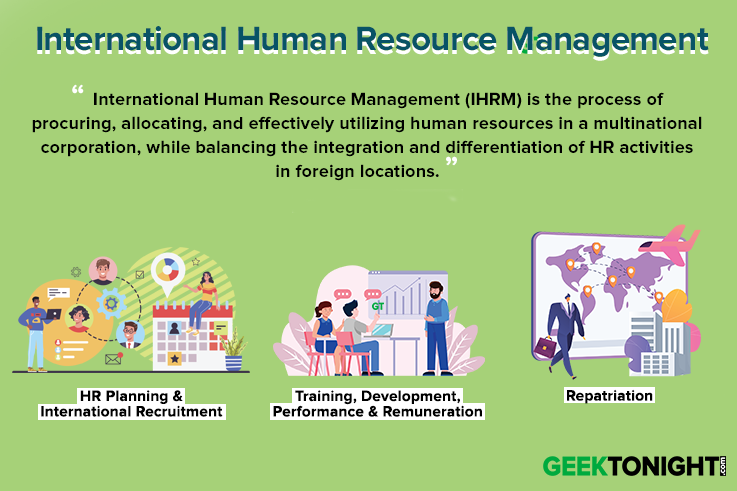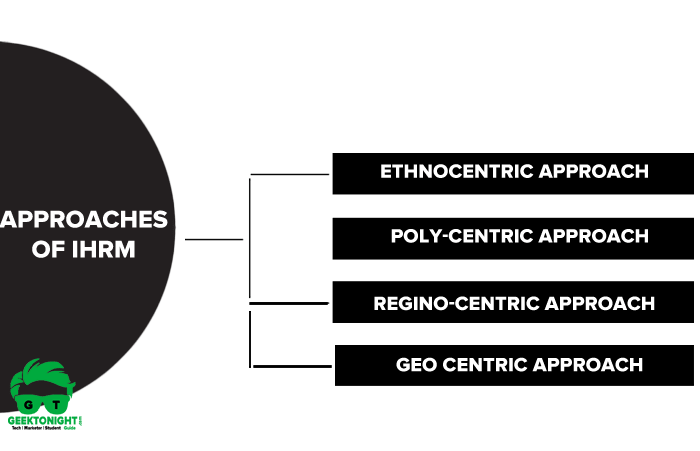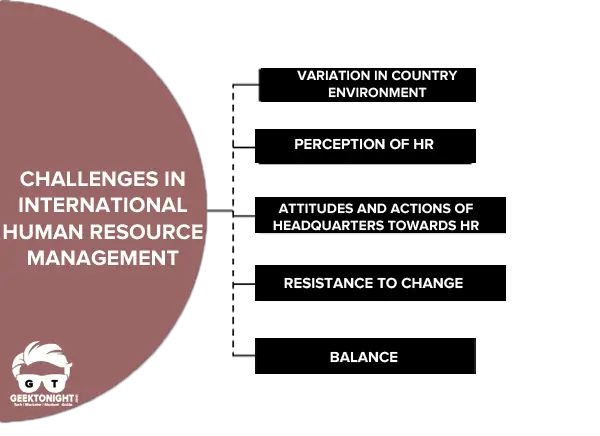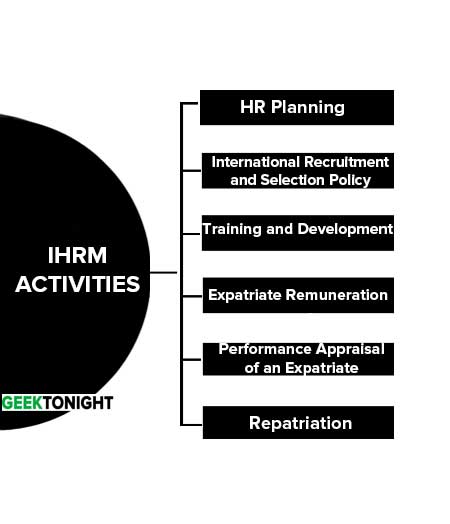What is International Human Resource Management (IHRM)?
International Human Resource Management (IHRM) is a field of study that focuses on the management of human resources in multinational corporations and other global organizations. It involves the application of HRM principles and practices to managing people in different cultural, institutional, and legal contexts across national borders.

Table of Content
- 1 What is International Human Resource Management (IHRM)?
- 2 International Human Resource Management (IHRM) Definition
- 3 Approaches of IHRM
- 4 Dimensions of IHRM
- 5 Challenges in IHRM
- 6 IHRM Activities
- 7 Cross Cultural Theories
- 8 Role of HR in Maintaining Ethical Policies & Behaviour
- 9 Code to Guide HR Professionals
- 10 Key Terms
- 11 Reference
International businesses are required to recruit, train, motivate, nurture and retain apart from effectively utilizing their services at all levels of functioning be its corporate office, at the foreign production units plants, therefore, the process of procuring, allocating and effectively utilizing human resources in international business is called International Human Resource Management.
International HRM is concerned with identifying and understanding how the MNC’s manage their geographically dispersed worked force in order to leverage their HR resources for obtaining local as well as a global competitive advantage.
International Human Resource Management has a wider concept and scope of operation and working as compared to domestic Human Resource Management. There are different approaches to International Human Resource Management.
International Human Resource Management (IHRM) Definition
International Human Resource Management (IHRM) is the process of procuring, allocating, and effectively utilizing human resources in a multinational corporation, while balancing the integration and differentiation of HR activities in foreign locations. – Dowling, Festing, and Engle (2017)
International Human Resource Management (IHRM) is the process of procuring, allocating, and effectively utilizing human resources in a global organization. – Society for Human Resource Management (SHRM)
IHRM is the process of managing people across international boundaries, and includes the full range of activities involved in the recruitment, selection, development, and retention of employees in a global environment. – International Labour Organization (ILO)
Approaches of IHRM
Fundamentally there have been different approaches to International Human Resource Management.
Approaches of IHRM are:

Ethnocentric Approach
In Ethnocentric approach, management believes that the approach of the parent company in managing things is the tried and tested practice and it should be followed in all units of the organization in different countries. This leads to the adoption of all systems, procedures, policies of the parent company from the parent country in all other centres of activities.
This may lead to conflicts in certain circumstances. When a company operates in different countries, the expectations and norms may vary from country to country.
Industrial unrest due to this mismatch of expectations and believes is quite common. In India agitations in Maruti, Honda etc in the recent past were examples of this approach.
In ethnocentric approach, most of the major decision making is centralised with the parent company. This is more in the case of management of Human Resources. The top management in host countries is also posted from the parent company so that the culture of the unit remains in line with the parent country.
The approach and practices of the parent country are not necessarily considered the best. There has to be a fit between the management approach and the culture of the host country. Therefore feelings, attitudes, norms, beliefs and societal acceptance of right and wrong of the host country should have an influence on the practices of parent country.
This led to gradual modification in Ethnocentric approach. At present time Ethnocentric organisations are very few and are gradually moving towards Poly-centric or Geo-Centric approach of management.
Poly-centric Approach
In Poly-centric approach or philosophy, MNCs realize the importance of the host country and its governing laws. Further, they are aware that the National culture plays an important role in all aspects of management. Hence it is prudent to follow the market needs of the host country and frame a strategy which can give the best results.
To implement such a strategy they need local knowledge and indepth understanding of the way of working in that country. They have to align their management style to suit the local culture and aspirations of the people in that country.
In this approach, organisations have local people are recruited at senior positions. There are very few Parent country nationals. The decision making is highly decentralised and local management takes all decisions. Apart from broad policies which are framed by the corporate at Parent country, all operational policies are decided at a local level.
In case of Management of Human Resources as well, the policies including compensation are decided locally. The guiding principles of culture like Values are driven from the corporate office in the Parent country, generally, all other policies are framed locally keeping in view the practices in that country.
Since in this approach there are very few ex-pacts in local unit or subsidiary, the cost of operation is limited. Such companies are able to compete on cost basis with the local companies as well. Otherwise, most of the companies create their market through a Differentiation strategy rather than cost focussed strategy.
Further these units become highly localised and empowered hence their connect with the corporate becomes loose over the years. At time they come out of the parent company and become purely locally owned subsidiary.
Regino-Centric Approach
In Regino-Centric approach, MNCs believe that though there is a difference in various aspects of culture from country to country yet there are similarities in a particular region.
For example, there may be differences in the cultures of India, Sri Lanka, Japan yet there are lot of similarities hence it may be appropriate that one Region is managed by one regional office. Thus MNCs set up regional offices to manage entire region consisting of all countries in this region.
They may classify Regions according to their business and presence in particular regions. Some companies may have Asia as a region while some other MNC may have the Asia Pacific as one region. There are various MNCs who now prefer to have a Regional Office of the Asia Pacific region or Asia region in India.
Such organisations are strong in innovation and creativity due to diversity in their workforce. Simultaneously such MNCs are able to channelise innovative practices across the globe in a significant manner. Inter region transfers and managing expatriate becomes the quite critical activity of Human Resource Management.
Geo Centric Approach
Geocentric approach of management believes in using the best strength wherever it is available within the organization without any consideration of geographical region or country.
Such organisations are very matured in their management structure, processes and systems. These organisations create a culture that has right proportion of flexibility as well as defining culture and boundaries which make them unique and highly effective.
The decision making processes in such organisations give weightage to local issues and concerns without deviating from the core value system of the organisation. Managing such an organisation need quick decision making and continuous monitoring of all functions across the globe. The IT-enabled integrated systems like ERPs have made it possible to achieve the above-stated objectives in a very smooth manner.
In these companies mobility of talent is frequent. Top positions are manned by people from any country. Professionalism is the diving force and equal opportunity irrespective of race, cast, religion, nationality, gender etc is one of their strong core values.
Geocentric approach is highly professional hence need very competent leaders at the top. Their training and coaching is given high importance by such companies. Generally, such companies believe and follow ‘homegrown talent strategy. They spend huge efforts in developing talent which is Culture fit.
Dimensions of IHRM
Various dimensions of IHRM are best conceptualized by Morgan. He considers International Human Resource Management as an interplay of various dimensions that impact management of Human Resources in international businesses.
These dimensions not only affect International Human Resources Management individually but have interplay and influence IHRM functioning. According to P.V. Morgan, IHRM is the interplay amongst 3 dimensions.
Dimensions of IHRM are:
- HR Activities for recruitment, selection, training, development, compensation, performance management, employee relations etc.
- Types of employees
- Types of Countries
- Parent Country nationals: Employees from the parent headquarters assigned to the venture, usually in the upper management positions.
- Host country nationals: Employees directly recruited and employed by the venture and are nationals of the host country. Generally these employees are employed at lower levels but gradually these employees are given responsibilities and senior management levels.
- Third country nationals: Employees who are nationals of neither the parent country nor the host country.
Challenges in IHRM
There are a number of unique problems that global companies face while trying to implement consistent practices across their global HR networks. These problems act as barriers to effective International Human Resource Management.
Challenges in international human resource management are:
- Variation in-country environment
- Perception of HR
- Attitudes and actions of headquarters towards HR
- Resistance to change
- Balance

Variation in country environment
PESTEL (Political, Economic, Social, Technological, Environmental and Social factors of countries varies. An HR practice which works in one country might not work in the same manner in another country. Fluctuations in currency, government policies and regulations, compensation expectations etc are just a few examples of the local variations s global HR professional faces.
Perception of HR
The perceived value of HR is another global challenge in HRM. In one country, HR in a company might be viewed as a true business partner, working with high-level managers on critical assignments. In another country within the same company, the same HR might just be viewed as a transactional personnel department that handles administrative work.
Attitudes and Actions of Headquarters towards HR
the perception sent from the headquarters towards HR also helps determine how HR is viewed locally. The position of the corporate chief HR officer also sends a strong signal to local units on the importance of the HR function.
Resistance to Change
The rate of change is enormous in multinational companies. Hence, a major challenge facing global HR practitioners is that different locations have their own way of doing things and resist to change.
Balance
International companies must strive to achieve the appropriate balance between global and local HR systems and practices. It is such firms that put into application the best practices and create a benchmark for others to follow.
Some of the best practices are:
- Establishing common systems in all locations, including accounting, distribution, marketing and management information systems.
- Creating an organizational mission based on inputs from individuals or teams in all locations
- Providing management education in all location about how the company wants to conduct business
- Creating a written manual about how parent organizations will institute and manage unique corporate identity
- Communicating to all locations that the parent organization is attempting to create common corporate culture with a shared mission, values, goals and more.
Diversity
There is cultural diversity in all countries and this affects the functioning of the organization in that particular country.
IHRM Activities
- HR Planning
- International Recruitment and Selection Policy
- Training and Development
- Expatriate Remuneration
- Performance Appraisal of an Expatriate
- Repatriation

HR Planning
Human resource planning is very complex and difficult at the international level. The planning is not confined to one country but extends to various other countries in which the MNC is operating or plan to operate in future. It is very difficult to maintain consistency in the HR planning in all the subsidiaries. The HR planning is influenced by the culture of the host country especially its perception towards the control over future events.
Such differences in perception towards the future will directly impact the HR planning process for e.g. societies that are oriented towards the past will heavily rely on historical data for making a prediction of future HR needs. HR planning is appropriate for the firms operating in a stable environment, but where the environment is highly unstable HR planning is not successful.
International Recruitment and Selection Policy
The objective of the international HR manager is to make available the right kind of human resource to the organization at the right time. This means after the HR planning recruitment and selection process will start. The international HR manager must hire the candidates not only with the required skills but also with the ability to adapt to the culture of the other country.
International managers can hire candidates from the three countries – parent country, host country and third country depending upon the requirement and suitability.
Training and Development
It is the next step after recruitment and selection. The International HR managers will provide the training and development to the new expatriate going to the host country. They are provided with pre-departure training before they depart for the host country. The expatriate are provided with cultural training, language training and practical training. This will help in reducing expatriate failure.
Expatriate Remuneration
International HR managers must pay focused attention while designing the remuneration package of the expatriate. It needs to be considered that there is a difference in the cost of living of the two countries and even the tax structure differs.
Performance Appraisal of an Expatriate
In this world of rising globalization expatriates are of immense importance to multinational enterprises. To keep them motivated appropriate and justified performance appraisals should be conducted. Appraising an expatriate is a complex task as there is active involvement of the home country supervisor and the host country supervisor.
Repatriation
Repatriation is the process of taking back the expatriate from the host country. It is the process of re-entry into the home country. It represents the new challenges because the expatriate now has to face the re-entry shock or reverse cultural shock. This process take place when the expatriate has completed his host country assignment and now he has been assigned a new assignment in the home country.
Cross Cultural Theories
- Hofstede’s Dimension Theory
- Hofstede’s Contribution to International Management
- Trompenaars & Hamden-Turner’s Seven Dimensions of Culture
- Kluckhohn & Strodbeck’s Cultural Demensions
Role of HR in Maintaining Ethical Policies & Behaviour
There is a special role of global managers to ensure that the organization deals fairly and ethically with its employees and the employees deal fairly with one another, the clients and the organization.
Some policies for organizations in this regard are:
• Respecting people and not exploiting them
• Not doing any harm
• Following truth always
• Keeping the promises
• Treating people fairly without discrimination
• Not depriving people of basic rights, such as right to speak etc.
In organizational terms, fulfilling these duties may translate in to the following:
- Instituting careful health and safety practices, informing employees of potentially hazardous conditions and taking responsibility for occupational disease and stress related illness traceable to working conditions.
- Being truthful in recruiting
- Avoiding the use of invalid and discriminatory selection, appraisal and promotions
- Paying equal pay for work of comparable worth
- Providing ways for employees to voice their concern and not illegally constraining employees to form an union
- Following fair practices with regard to discipline, termination for cause and layoffs
Code to Guide HR Professionals
Keeping these into mind, the Society for Human Resource Management (SHRM) has formulated a code to guide HR professionals as given below:
- Professional Responsibility: HR professionals are responsible for adding value to the organizations they serve and contributing to the ethical success of those organizations. HR professionals are also advocates for the profession by engaging in activities that enhance its credibility and value.
- Professional Development: As professionals we must strive to meet the highest standards of competence and commit to strengthen our competencies on a continuous basis
- Ethical Leadership: HR professionals are expected to exhibit individual leadership as a role model for maintaining the highest standards of ethical conduct.
- Fairness and Justice: As human resource professionals, we are ethically responsible for promoting and fostering fairness and justice for all employees and their organizations.
- Conflicts of Interest: As HR professionals, we must maintain a high level of trust with our stakeholders. We must protect the interests of our stakeholders as well as our professional integrity and should not engage in activities that create actual, apparent, or potential conflicts of interest.
- Use of Information: HR professionals consider and protect the rights of individuals, especially in the acquisition and dissemination of information while ensuring truthful communications and facilitating informed decision-making.
Key Terms
- Ethnocentric Approach: This approach believes that Parent country practices should be followed in all countries in managing Human Resources. They are good enough to manage in-country.
- Poly-centric Approach: This approach of IHRM believes that the host country practices and culture are relevant and IHRM must give blend host country practices in managing Human Resources to make it effective.
- Regiono- centric: This approach gives importance to commonalities of a region and adopts practices of the region. Thus practices vary from region to region.
- Geo-Centric: This approach is much matured and accepts that practices in different geographies have different strength. Thus best practices should be adopted in different countries it may be from any geographies.
- Parent Country National: This term means Parent Country National & connotes to those who belong to the Parent country of the MNC.
- Host Country National: This term means Host Country National & connotes to those who are nationals of the host country where and MNC has establishment or operations or Subsidiary.
- Third Country National: This term means Third Country National & connotes to those who belong to the country which is neither the Parent country of that MNC, not the host country.
Reference
- BARNEY, J., 1991. Firm resources and sustained competitive advantage. Journal of management, 17(1), pp. 99.
- GUPTA, S.C. 2012. International Human Resource Management- Text and Cases: MacMillan, New Delhi.
- SCHULER, R.S., DOWLIN G, P.J. and DE CIERI, H., 1993. An integrative framework of strategic international human resource management. Journal of Management, 19(2), pp. 419.
Go On, Share & Help your Friend
Did we miss something in Human Resource Management Tutorial or You want something More? Come on! Tell us what you think about our post on International Human Resource Management | in the comments section and Share this post with your friends.
Human Resources Tutorial
(Click on Topic to Read)





